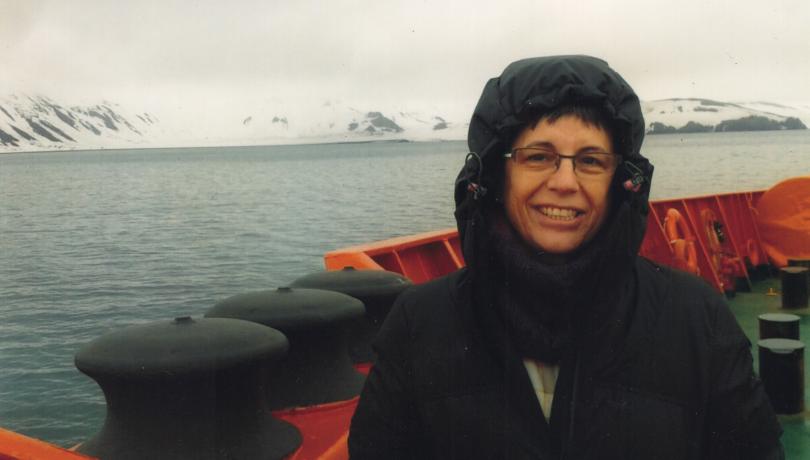In this month's "In Depth" section we talk to researcher Celia Marrasé Peña about climate change, social justice and conciliation in the scientific world.

In this month's "In Depth" section we talk to Cèlia Marrasé Peña, scientific researcher at the Institut de Ciencias del Mar (ICM-CSIC) for more than 40 years. In 1981 she landed at the center to study the ecology of plankton under the direction of Marta Estrada, and since then she has been dedicated to studying the interactions between the physical, chemical and biological processes that occur in marine systems. During her professional career, the researcher has held positions of great relevance. For example, she was a member of the Global Ocean Dynamics (GLOBEC) project steering committee from 1999 to 2004 and took part in the SCOR/IGBP Planning Committee on the Future Ocean Biogeochemistry from 2000 to 2001. In addition, she was part of the external advisory committee of the European Network of Facilities on Large Experimental Aquaria (AQUACOSM) from 2009 to 2012 and chaired the Iberian Society of Ecology (SIBECOL) from 2019 to 2023. At the ICM-CSIC she has held the positions of vice-director (2019-2022) and head of the Department of Marine Biology and Oceanography (2009-2014).
1. What are your main areas of research?
My career has always been marked by curiosity and love for nature. When I was young, I was first interested in research on the causes of cancer and, in particular, the cause by viral infection. Nevertheless, later I attended Dr. Ramón Margalef's classes and my interests turned towards marine ecology. During my professional career I have devoted myself to study the interactions between physical and biological processes in marine systems at different scales, in particular, the effects of small-scale turbulence on the activities of planktonic organisms. However, in recent years I have focused on investigating the remineralization of organic matter, one of the key processes for understanding the carbon cycle in marine systems and assessing the capacity of the ocean to store carbon.
2. You have been on many oceanographic campaigns, what should be considered when designing them?
In oceanographic expeditions it is necessary to plan according to specific hypotheses and considering the limitations of infrastructure, time and geographical constraints. Also, the selection of depths to be sampled and data collection will depend on the questions posed in the study. Finally, in biological oceanography, collaboration with scientists from other disciplines is essential to understand the functioning of marine ecosystems.
3. Tell us a curious anecdote from your years as a researcher!
In the 1990s I submitted a proposal to organize a European course and the evaluation committee recommended that I contact a Norwegian scientist who had submitted a similar project to merge them. After exchanging our proposals, this scientist recognized that mine was much better prepared, so he withdrew from the call and ended up commenting to a colleague the following: "I was surprised that the person who presented that excellent project was a "woman and a Spaniard".
4. Talking about science outside Spain, how important are international collaborations in the scientific world?
International collaborations are crucial to obtain different perspectives and resources. However, it is necessary to define expectations and objectives from the beginning to ensure effective cooperation and sharing of data and results. In the end, collaboration always enriches research and allows more complex questions to be addressed.
5. Changing the subject, how do you manage to reconcile research with motherhood?
Reconciling motherhood with a scientific career can be a challenge, but I think that attitude is key. It is very important to have family support and to have children at an early age to have more energy. Motivation and willingness to focus on essential tasks is also key.
6. Speaking of women, why do you think there are fewer women than men in top positions in the scientific world?
There are several reasons for the gender inequality in leadership, such as the burden of family responsibilities, whether caring for children or the elderly, which often falls on women. Also, the different perception of women as leaders compared to men and the tendency to give more credence to male opinions contribute to increasing the gender inequality. Therefore, there is a need to change the mindset when it comes to leadership, promoting equality and collaboration. The advice I would give to men is to recognize that women are on the same level as they are and can lead and collaborate with equality.
7. Regarding climate change, what do you see as the most worrying effects?
I would highlight the acceleration in the increase of temperatures and the concern for social injustice; since in the end the poorest communities are the most affected by climate change. In this sense, we must understand that renewable energies cannot solve the climate crisis if they are not accompanied by other measures, because many of the resources used to develop renewable energy infrastructures are not unlimited and are often located in poor countries that are exploited by rich countries, which generates even more social injustice.
8. What solutions are currently available?
Although it may be hard to admit, the solution lies in reducing energy consumption. There are several ways to reduce it without a major negative impact, such as avoiding certain types of tourism, encouraging much more use of public transport, cycling and walking. Other significant energy savings could be achieved through improvements in building insulation.
9. Finally, what advice would you give to young people who are starting in the scientific world?
To young people I would say that if they are curious and passionate about science and nature, go ahead and don't let uncertainty about future work stop them. Science requires vocation, dedication and love for knowledge, and if they have it, they will keep moving forward. If their motivation is to make a quick buck, then they should consider other options. It is an enriching path if you have the right passion.